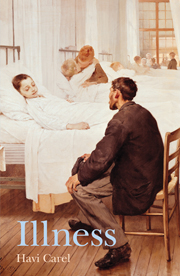Book contents
4 - Fearing death
Summary
One of the many questions facing ill people, or at least those with poor prognosis, is: how should we face death? Of course, this question is one that every person faces, in some way, with the realization that their existence is finite. The knowledge of our mortality is a heavy burden, and many philosophers have claimed that cultivating an appropriate attitude towards it is the key to leading a good life. Some, such as Socrates, Cicero and Montaigne, thought that practising philosophy is learning how to die, because the practice of pure thinking separates the soul from the body. As Montaigne writes in his essay “To Philosophize is to Learn How to Die”: “study and contemplation draw our souls, somewhat outside ourselves, keeping them occupied away from the body, a state which both resembles death and which forms a kind of apprenticeship for it” (1993: 17).
Montaigne provides a second, more compelling reason for the view that philosophy prepares us for death: “all the wisdom and argument in the world eventually come down to one conclusion; which is to teach us not to be afraid of dying” Philosophy's practical or therapeutic role is to prepare us to meet death with equanimity. Preparing for death is thus also a lesson in how to live well. As Socrates says, those who pursue philosophy rightly “study to die” and “to them of all men death is least formidable” (Phaedo 67D). Philosophy can help us live well by helping us to cultivate an appropriate attitude towards our finitude.
- Type
- Chapter
- Information
- Illness , pp. 105 - 140Publisher: Acumen PublishingPrint publication year: 2013



